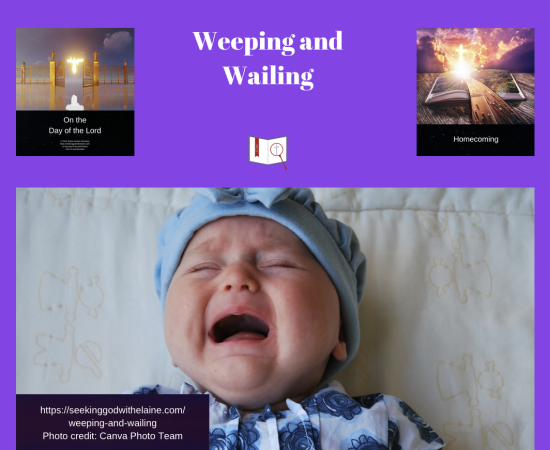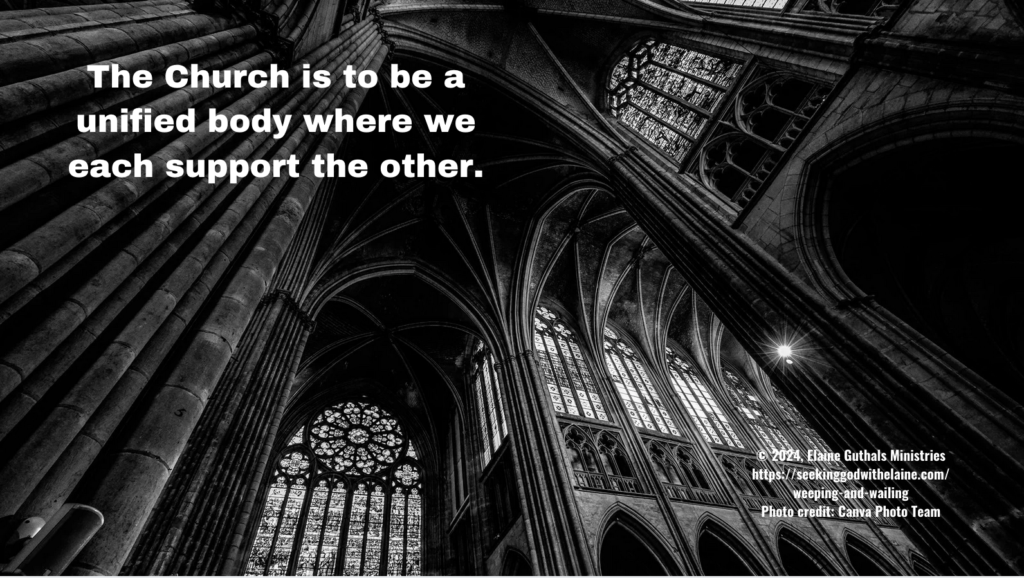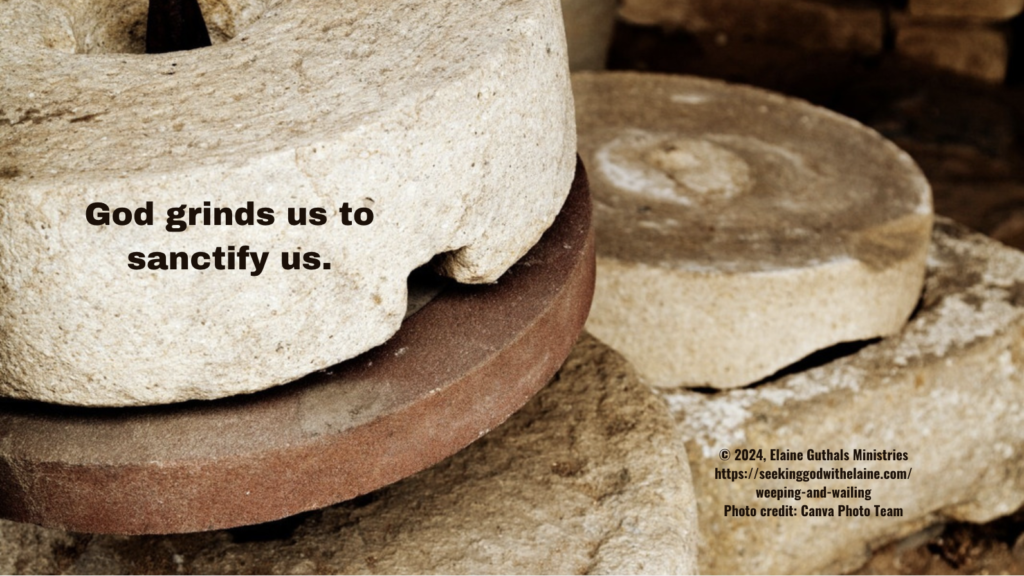After the Church is called to Heaven, worldview people will remain on earth. This devotional reading looks at the cause of the weeping and wailing they will do and their responses.
Nuggets
- There will be a lot of weeping and wailing going on, even by the world leaders, after the Church is raptured.
- The merchants will weep and wail because people won’t be buying from them anymore.
- This passage is confusing until we realize that the sea we have been discussing is humanity.

God is going to call His children home in the twinkle of an eye. I wouldn’t want to be numbered with those who remain in the next twinkle.
God’s Word tells us that there will be weeping and wailing. We have to figure out if the crying was because they didn’t get the heavenly homecoming. Or if they were wailing because the homecoming on earth was wrecked.
Let’s look at what their response will entail.
Let's Put It into Context
To read devotions in the On the Day of the Lord theme, click the button below.
Devotions in the Homecoming series
Weeping and Wailing of the Kings
“And the kings of the earth, who committed sexual immorality and lived in luxury with her, will weep and wail over her when they see the smoke of her burning. They will stand far off, in fear of her torment, and say, ‘Alas! Alas! You great city, you mighty city, Babylon! For in a single hour your judgment has come’” (Rev. 18: 9-10 ESV)
There will be a lot of weeping and wailing going on, even by the world leaders, after the Church is raptured.
After the Church is called home, there will be people left. They will be weeping and wailing.
But they won’t be weeping because they are sorry that they didn’t get to go to Heaven. The kings will be wailing because they see their material possessions burning up.
The kings were living in luxury and fulfilling their own desires. That is the exact opposite of what they should have been doing what was good for all.
Weeping and Wailing of the Merchants
“And the merchants of the earth weep and mourn for her, since no one buys their cargo anymore, cargo of gold, silver, jewels, pearls, fine linen, purple cloth, silk, scarlet cloth, all kinds of scented wood, all kinds of articles of ivory, all kinds of articles of costly wood, bronze, iron and marble, cinnamon, spice, incense, myrrh, frankincense, wine, oil, fine flour, wheat, cattle and sheep, horses and chariots, and slaves, that is, human souls. ‘The fruit for which your soul longed has gone from you, and all your delicacies and your splendors are lost to you, never to be found again!’ The merchants of these wares, who gained wealth from her, will stand far off, in fear of her torment, weeping and mourning aloud, ‘Alas, alas, for the great city that was clothed in fine linen, in purple and scarlet, adorned with gold, with jewels, and with pearls! For in a single hour all this wealth has been laid waste.’…” (Rev. 18: 9-17 ESV)
The merchants will weep and wail because people won’t be buying from them anymore.
And the list of what is no longer available is a long list. They aren’t going to be available anymore.
But they are going to stand a distance away. They weren’t going to get involved – even to render aid.
Our focus shouldn’t be on material possessions. Why? “For in a single hour all this wealth has been laid waste.’…” (Rev. 18: 17 ESV).
What? You think God would fix it, so they won’t be mad?
No, that isn’t how God works. Conway explained. He wrote, “Resentment and wrath are passions given us by God. Our peril and propensity is lest we turn them in a wrong direction.”
Resource
It all goes back to free will. We choose how we react to circumstances. We choose between God and Satan.
Have you ever heard the saying that misery loves company? This sure sounds like they do.
We know what happens when we get together with friends. We have a big whine and cheese party that goes on and on and on.
The weeping and wailing goes on and on here, too. We see it in verses 11, 15, and 16, and we’ll see it again in verse 19.
Thomas said something that I have to process. He wrote,
“When the grand altruistic truth of Christian socialism becomes [realized] by the masses — ‘Let no man seek his own, but every man another’s wealth’ — then the every-man-for-himself principle will fall, and with its fall what will become of the enormous possessions which they have obtained merely by working for themselves?
Resource
I can see what Thomas is getting at, but I have a huge, Whoa!
I can see this as the group – the congregation – taking care of itself. This is, in fact, in the Levitical law and what the early Church did.
- “If your brother becomes poor and cannot maintain himself with you, you shall support him as though he were a stranger and a sojourner, and he shall live with you. Take no interest from him or profit, but fear your God, that your brother may live beside you. You shall not lend him your money at interest, nor give him your food for profit. I am the Lord your God, who brought you out of the land of Egypt to give you the land of Canaan, and to be your God” (Lev. 25: 35-38 ESV).
- “And they were selling their possessions and belongings and distributing the proceeds to all, as any had need” (Ac. 2: 45 ESV).
The Church is to be a unified body where we each support the other.

My big whoa! is that, in my opinion, socialism wants us to take care of each other, so we don’t have to rely on God to take care of us.
That is the exact opposite of what God wants. Look at Leviticus again. It talks about fearing God, God providing for us, and God being our God.
Did you catch that in the middle of the wording? “And the merchants of the earth weep and mourn for her, since no one buys their cargo anymore … wine, oil, fine flour, wheat, cattle and sheep, horses and chariots, and slaves, that is, human souls” (Rev. 18: 11,13 ESV emphasis added).
Resource
The merchants were sad because they no longer could sell their slaves – human souls.
Many think that slavery is over. We are too civilized now to do that.
However, it has been modernized to human trafficking. That shows we are just as lawless as ever. We still have no regard for mankind.
But sin is slavery. “Jesus answered them, ‘Truly, truly, I say to you, everyone who practices sin is a slave to sin’ (Jn. 8: 34 ESV).
Since the verse talks about souls, it seems it is aligning itself with the spiritual condition.
We can also look at this under the lens of what seems the most described sin, along with living in luxury: sexual immorality. That is a joining of bodies and sometimes souls.
Response of the Common Man
“… And all shipmasters and seafaring men, sailors and all whose trade is on the sea, stood far off and cried out as they saw the smoke of her burning, ‘What city was like the great city?’ And they threw dust on their heads as they wept and mourned, crying out, ‘Alas, alas, for the great city where all who had ships at sea grew rich by her wealth! For in a single hour she has been laid waste’” (Rev. 18: 17-19 ESV)
This passage is confusing until we realize that the sea we have been discussing is humanity.
I know. It starts out talking ships and sailors, so how did we get common man out of it?
Look at verses 18 through 19. They were crying huge tears that were extremely selfish.
- No city greater than this city?’
- All ships owners grew rich by her wealth!
All that was gone in a single hour she has been laid waste.
And what are they upset over? That they couldn’t gain any more back.
Even then/now with worldview people, they will not be concerned with their spiritual condition.
Rejoice
“Rejoice over her, O heaven, and you saints and apostles and prophets, for God has given judgment for you against her!” (Rev. 17: 20 ESV)
All the inhabitants of Heaven and all the children God is calling home should rejoice that judgment has occurred.
Why are we rejoicing that Babylon – namely the earth – has been defeated? We live here.
We keep saying that there will be more people who end up in hell than there are that end up in Heaven. This is something Jesus said.
“Enter by the narrow gate. For the gate is wide and the way is easy that leads to destruction, and those who enter by it are many. For the gate is narrow and the way is hard that leads to life, and those who find it are few” (Mt. 7: 13-14 ESV).
Why should we rejoice? God has avenged us.
Remember, God says in His Word. “Beloved, never avenge yourselves, but leave it to the wrath of God, for it is written, ‘Vengeance is mine, I will repay, says the Lord’” (Rom. 12: 19 ESV).
It isn’t up to us to avenge. We don’t judge. We can’t repay.
It is all up to God – so we should rejoice that He does it on our behalf.
Moral Evil Symbolized
“Then a mighty angel took up a stone like a great millstone and threw it into the sea, saying, ‘So will Babylon the great city be thrown down with violence, and will be found no more; and the sound of harpists and musicians, of flute players and trumpeters, will be heard in you no more, and a craftsman of any craft will be found in you no more, and the sound of the mill will be heard in you no more, and the light of a lamp will shine in you no more, and the voice of bridegroom and bride will be heard in you no more, for your merchants were the great ones of the earth, and all nations were deceived by your sorcery. And in her was found the blood of prophets and of saints, and of all who have been slain on earth” (Rev. 18: 21-24 ESV)
Judgment is carried out.
A millstone is a set of stones by which to grind grain. This heavy, two-stone set would be abrasive against the grain but would be successful with work.
While the angel throws the stone into the sea, it will sink quickly. All will be lost.
But then we have a list of things we think of as good things – music, instruments, crafts – even the sound of the mill. It shows us that there are good things in Babylon.
In other words, there are good and bad in everything. The issue in Babylon is there is more evil than good.
Burrkitt noted why this list was given. In hell, where non-believers will reside, there won’t be music, instruments and other things to bring pleasure.
Resource
But that is the first of the things that won’t be in hell.
• Profit
• Food
• Relief
• Propagation
The millstone also was a great symbolization of the grounding that goes on within us. God grinds us to sanctify us.

We probably don’t realize the significance that the “… the light of a lamp will shine in you no more …” (Rev. 18: 23 ESV). Especially in the first century, the flame was not allowed to go out.
But is that what it really says?
“and the light of a lamp will shine in you no more, and the voice of bridegroom and bride will be heard in you no more, for your merchants were the great ones of the earth, and all nations were deceived by your sorcery” (Rev. 18: 23 ESV).
Jesus is the Bridegroom. It is His voice that we won’t hear and light that will no longer be in us.
That is true for those who ABCDed.
The ABCDs of Salvation
If you have not become a believer in Christ, please read through the
Plan of Salvation and prayerfully consider what God is asking you to do.
A – admit our sins
B – believe His Son Jesus is our Redeemer
C – confess God as Sovereign Lord
D – demonstrate that commitment by making any changes needed in our lives to live the way in which God has called us
The Disciple’s Job Description
Making the Connections #1
I love what Thomas said. He wrote, “Wrong, including all that is morally evil ill human thought, feeling, and action is constantly falling. Though it has a very slow death, it will by the eternal law of moral disintegration be one day brought down.”
Resource
That is the exact opposite of the worldview thinks! They keep thinking it should just get better and better.
It may seem like it, but it really isn’t. The only way it will improve is if we ABCD.
Judgment will come if we don’t.
Yes, God has every right to bring judgment on us. As Thomas said, evil should not have the power and authority that it was given after the original sin.
Judgment will bring us and the universe back into complete alignment with God’s paradise.
Making the Connections #2
Yes, God still has ahold of us all – believers and non-believers. Conway called us tenants-at-will.
God created us and everything else. He didn’t abdicate ownership of it to us.
So, He is still Sovereign God, and Jesus is King of kings and Lord of lords.
Because of this, we shouldn’t buy into the worldview. Conway described it this way. He wrote, “… we have no share in this heart-apostacy of Babylon the great, even in the commercial world.”
Resource
Remember, we are coming out of this world. “Go out from Babylon, flee from Chaldea, declare this with a shout of joy, proclaim it, send it out to the end of the earth; say, ‘The LORD has redeemed his servant Jacob!’” (Isa. 48: 20 ESV).
If we don’t share in their sins, we won’t share in their judgment. The biggest sin is to renounce and deny God. God also puts great store in our living a holy life.
Making the Connections #3
What is the prevailing theme when we were talking about the people of Babylon? They had lived lives of luxury. Now, that was gone.
Bennetts reminded us that there are numerous warnings about falling into that pit. We tend not to listen, do we?
Resource
We don’t tend to learn from history, unfortunately. There are too many people want it rewritten.
That isn’t going to help matters.
One thing God says time and time again in His Word is that we are to remember. Remember where we have been without Him and what He provides when we are His children.
How Do We Apply This?
- Witness to non-believers so that we may put an end to shameful wickedness and redeem their bodies and souls.
- Put the correct emphasis on money and luxury.
- Don’t be covetous.
- Have no idol above God.
Resources
Father God. It breaks our hearts that there will be those who have not accepted You as Sovereign God at the end of the age. Lord, we pray for those whom You have put in our paths to whom we are to witness. Give us strength and boldness to win others to You. Amen.
What do you think?
Leave me a comment below (about this or anything else) or head over to my Facebook group for some interactive discussion.
If you don’t understand something and would like further clarification, please contact me.
If you have not signed up for the email providing the link to the devotions and the newsletter, do so below.
If God has used this devotion to speak with you, consider sharing it on social media.